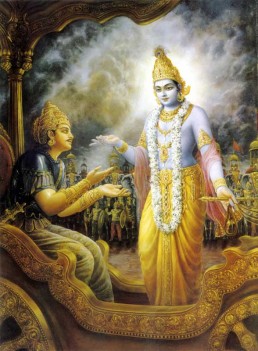Commentary
The effect of single-pointed devotion to The Lord is stated here. Sri Krishna says that such a person soon becomes righteous – he realizes the Divine Atman in himself. He attains eternal peace – an inward peace which is beyond the tumults of the daily living. He lives in tranquility free from agitations and excitements. He rediscovers in himself his own real nature which is Supreme Peace. Such a devotee never perishes or is destroyed. The seeker of the nobler values shall have no failures if his resolve is firm and his application is sincere.
The import of this and the previous verses is that the constant awareness of the Divine Principle protects the human personality from the destructive nature of its negative tendencies. Once we place ourselves in the hands of the Divine we cannot fall into the chasm of darkness.
Swami Chinmayananda
Swami Chinmayananda Commentary
The commentary on this verse and the rest, is avaialble for free as:
Kindle eBook
Google Play Book
Apple Books
Adi Sankara Commentary
Having given up his external evil behaviour due to the strength of his internal proper resolves, ksipram bhavati, he soon becomes; verily dharma-atma, possessed of a virtuous mind; and nigaccahti, he attains; sasvat, everlasting; santim, peace, quietude [Cessation of evil acts.]. O son of Kunti, listen to the supreme Truth: Pratijanihi, do you proclaim boldly, make a firm declaration; that me, My; bhaktah, devotee, who has dedicated his inner being to Me; na, does not; pranasyati, get ruined. Moreover,
The Bhagavad Gita with the commentary of Sri Sankaracharya – Translated by Alladi Mahadeva Sastry
Holy Geeta – Commentary by Swami Chinmayananda
The Bhagavad Gita by Eknath Easwaran – Best selling translation of the Bhagavad Gita
The Bhagavad Gita – Translation and Commentary by Swami Sivananda
Bhagavad Gita – Translation and Commentary by Bhaktivedanta Swami Prabupadha
Srimad Bhagavad Gita Chapter 9 – Verse 31 – 9.31 ksipram bhavati – All Bhagavad Gita (Geeta) Verses in Sanskrit, English, Transliteration, Word Meaning, Translation, Audio, Shankara Bhashya, Adi Sankaracharya Commentary and Links to Videos by Swami Chinmayananda and others – 9-31

